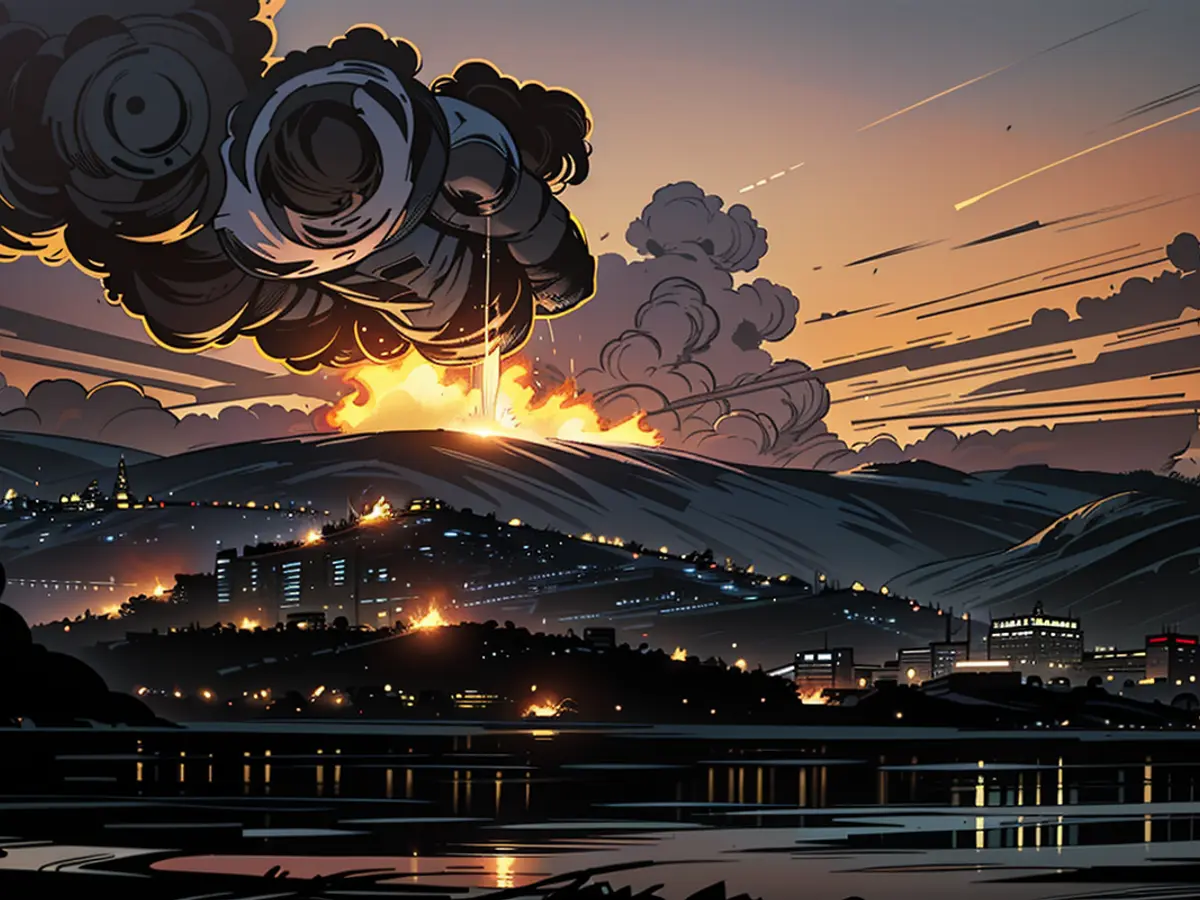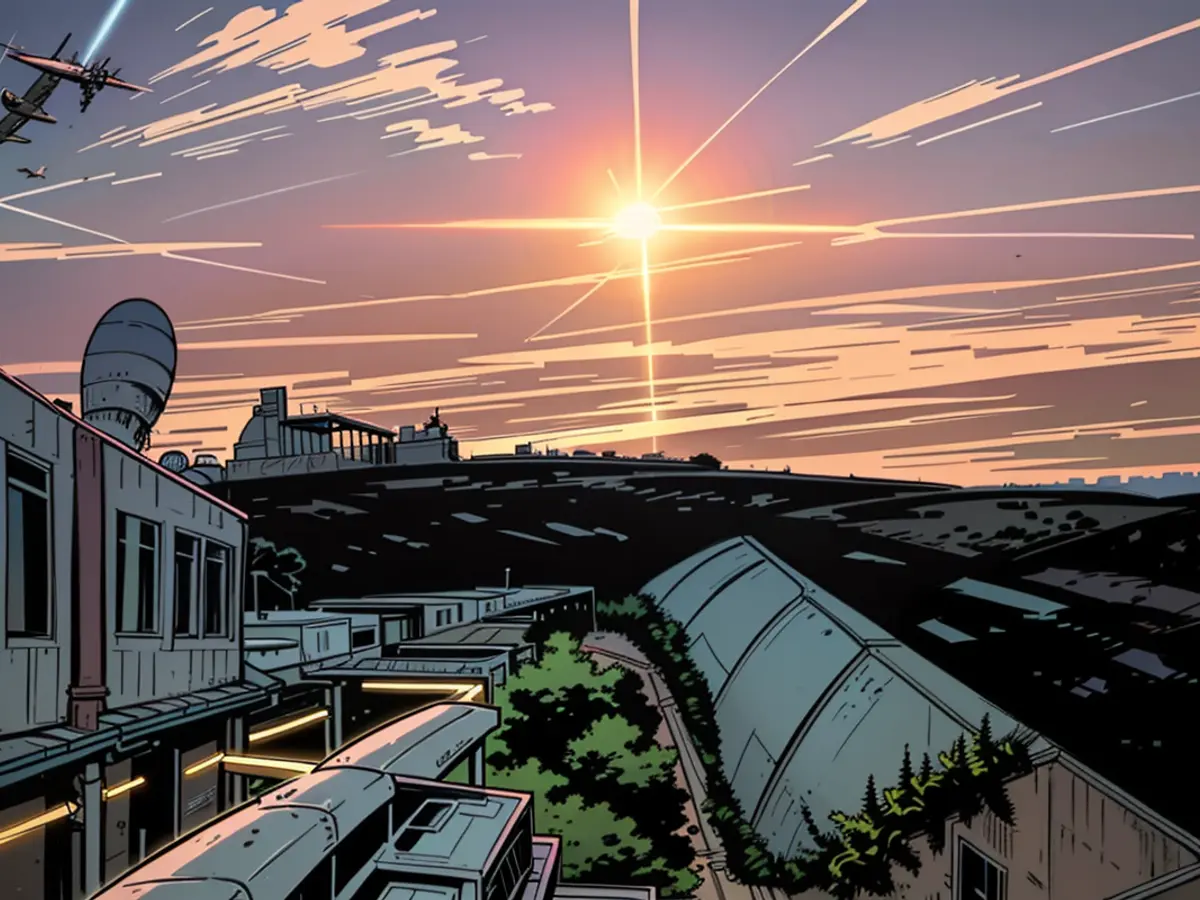Hezbollah announces cessation of planned attack; Israel asserts successful prevention of hostile activities
For weeks, tensions between Hezbollah and Israel have been simmering. Now, the radical Islamic group claims to have initiated its "initial stage" of reprisals, launching hundreds of rockets. Israel asserts that they successfully foiled the attack, targeting and bombing sites in Lebanon.
Hezbollah militants in Lebanon have allegedly completed the preliminary stage of their retaliatory assault. "Our operations for today are concluded," the Iran-financed militia declared. All rockets, as planned, were launched at Israeli targets. As reported by the Shia militia, over 320 Katyusha rockets were fired at Israeli military bases and other locations. Israeli media reports suggest around 200 rockets and about 20 drones were fired from Lebanon towards Israel, many of which were intercepted. The heightened threat levels led to the temporary suspension of operations at Ben Gurion Airport in Tel Aviv.
Israel's army claims to have recognized "the imminent peril to the citizens of Israel" and earlier attacked numerous targets in southern Lebanon in a "defensive measure". Around 100 combat aircraft attacked Hezbollah targets in southern Lebanon, the military stated. Various defense, naval, and air force units were mobilized for the attacks.
Prime Minister Benjamin Netanyahu claimed that Israel detected Hezbollah's attack preparations ahead of time and averted a large-scale attack through its attacks in Lebanon. Working together with Defense Minister Joav Galant and Military Chief Herzi Halevi, he ordered the army to "eliminate the threat". The military reportedly destroyed thousands of rockets aimed at northern Israel and eliminated numerous other threats, according to Netanyahu. The military is operating aggressively, both defensively and offensively, he explained.
In response, Hezbollah announced a forthcoming speech from its Secretary-General Hassan Nasrallah, in which he will also address Israel's claim of having thwarted a Hezbollah attack in Lebanon through its own attacks.
Strikes on rocket launchers
Lebanese security sources confirmed that Israel attacked at least 40 targets in southern Lebanon. Local authorities reported three fatalities. Fighter jets reportedly targeted power and water plants, according to the state-run Lebanese news agency NNA and security sources. A Western intelligence official told the "New York Times" that Israel's attack targeted rocket launchers in Lebanon that were programmed to be fired towards Tel Aviv at 5 a.m. local time.
The Israeli news site "ynet" reported, citing an unnamed source, that Hezbollah had planned an assault on a "strategic facility in the Tel Aviv region", including potential attacks on Ben Gurion Airport. According to Lebanese reports, Israeli fighter jets patrolled near the coastal city of Tyre in southern Lebanon and attacked several villages.
Israel warns of further escalation
Concurrently, military spokesman Daniel Hagari issued new guidance for civilians residing in the Greater Tel Aviv area and Israel's northern border. In that region, individuals may continue to work and send their children to summer camps, provided that shelters are readily accessible, according to Hagari. The continued aggression of Hezbollah poses the risk that "the Lebanese people, the Israeli people - and the entire region - will be dragged into further escalation", he warned.
Netanyahu urged Israeli citizens to adhere to military instructions. "We are resolved to do everything to safeguard our nation, facilitate the safe return of northern residents to their homes, and maintain one immutable rule: Those who harm us will face retaliation."
The specter of a regional conflict has lingered since late July, when two prominent Hamas and Hezbollah figures were killed in attacks. Hamas' external chief, Ismail Haniyeh, perished in an explosion at a guesthouse of the Iranian government in the capital Tehran.
Fuad Shukr, a de facto military chief of Hezbollah, was killed in an airstrike in Beirut. Israel took responsibility for Shukr's targeted killing but remained silent about the assassination of Haniyeh.
Since the initiation of the Gaza war between Israel and the Islamist Hamas a year ago, the Hezbollah militia, aligned with Hamas, has regularly shelled targets in Israel's neighboring north. In response, the Israeli military consistently strikes targets in the neighboring country.
The escalating tensions between Hezbollah and Israel continued, with Hezbollah militants announcing the commencement of the 'War with Israel', marking the start of their full-scale retaliatory actions against Israel. Despite Hezbollah's claims, Israel's military successfully intercepted and neutralized a significant number of incoming rockets and drones, aiming to minimize the impact on its citizens.









